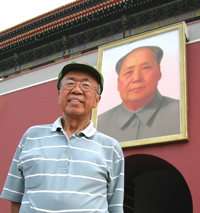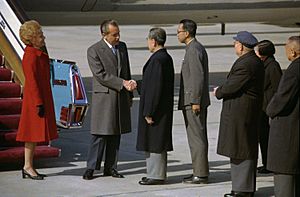Ji Chaozhu facts for kids
Quick facts for kids
Ji Chaozhu
|
|||||||
|---|---|---|---|---|---|---|---|
| 冀朝铸 | |||||||

Ji Chaozhu at Tiananmen Square in 2005
|
|||||||
| Under-Secretary-General of the United Nations for Department for Development Support and Management Services | |||||||
| In office 1991–1996 |
|||||||
| Secretary-General | Javier Pérez de Cuéllar Boutros Boutros-Ghali |
||||||
| Ambassador of China to the United Kingdom | |||||||
| In office August 1987 – March 1991 |
|||||||
| Preceded by | Hu Dingyi | ||||||
| Succeeded by | Ma Yuzhen | ||||||
| Ambassador of China to Fiji with accreditation as Ambassador to Kiribati & Vanuatu |
|||||||
| In office September 1985 – May 1987 |
|||||||
| Preceded by | Shen Zhiwei | ||||||
| Succeeded by | Xu Mingyuan | ||||||
| Personal details | |||||||
| Born | July 30, 1929 Taiyuan, Shanxi, China |
||||||
| Died | April 29, 2020 (aged 90) Beijing, China |
||||||
| Relations | Ji Gongquan (father) Ji Chaoding (elder brother) Chao-Li Chi (elder brother) |
||||||
| Occupation | Diplomat, author | ||||||
| Chinese name | |||||||
| Traditional Chinese | 冀朝鑄 | ||||||
| Simplified Chinese | 冀朝铸 | ||||||
|
|||||||
Ji Chaozhu (born July 30, 1929 – died April 29, 2020) was an important Chinese diplomat. He held many key roles in China's Ministry of Foreign Affairs. He was best known as an English interpreter for top Chinese leaders. These leaders included Chairman Mao Zedong, Premier Zhou Enlai, and Deng Xiaoping.
Later, he became China's Ambassador to the United Kingdom. He also served as an Under-Secretary-General of the United Nations. He retired from this role in 1996. Ji Chaozhu played a big part in the talks before and during US President Richard M. Nixon's historic visit to China in 1972. His life story was published in a book called The Man on Mao's Right in 2008.
Contents
Early Life in the United States
Ji Chaozhu was born on July 30, 1929, in Shanxi Province, China. His family was wealthy and supported the Communist Party. His father was a rich landlord, lawyer, and government official. His oldest brother, Ji Chaoding, was a famous economist.
In the late 1930s, during the Second Sino-Japanese War, Ji and his family left their home in Taiyuan. In 1939, when Ji was nine, his family moved to New York City. This move was suggested by Zhou Enlai. Ji graduated from Horace Mann-Lincoln High School. He also attended Camp Rising Sun in 1944.
In 1950, he was a student at Harvard University. The Korean War began that year. This meant his home country and his adopted country were fighting each other. Ji said he felt "torn between [his] love for two countries." But he knew he was "fundamentally Chinese."
Returning to China and Becoming an Interpreter
Ji left Harvard before finishing his studies. He returned to the newly formed People's Republic of China. He first studied chemistry at Tsinghua University in Beijing. His goal was to become a scientist and help China develop nuclear weapons.
However, his excellent English skills led him to a different path. He was chosen to be an interpreter and notetaker. This was for the peace talks in Panmunjom that ended the Korean War. After two years in Korea, he went back to Beijing. There, he was asked to become Zhou Enlai's English interpreter.
He traveled with Premier Zhou to the 1954 Geneva Conference and many other international trips. For nearly 20 years, he was a close helper to Zhou. He often interpreted for Mao Zedong. He was frequently seen standing to Mao's right at Tiananmen Square during public events. He was the interpreter for Mao Zedong's last two official meetings with English-speaking visitors in 1976. This was just months before Mao's death.
Key Role in US-China Relations
Throughout his long career, Ji's deep understanding of American culture was very valuable. This was especially clear during Henry Kissinger's secret visit to Beijing in 1971. That visit led to President Nixon's visit to China the next year.
In 1973, Zhou Enlai chose Ji to lead China's first diplomatic mission to the US. Ji helped set up China's first liaison office in Washington. Later, he joined the Chinese embassy staff in the US when full diplomatic relations began. He also interpreted for Deng Xiaoping during his visit to the US in 1979.
The New York Times newspaper noted something special about him. From Nixon's visit to China until Deng's visit to the US, Ji was the only person who could interpret from English to Chinese for both countries. The newspaper called him "The Indispensable Mr. Chi." US officials respected him greatly. In 1981, Secretary of State Alexander Haig specifically asked China to send Ji. This was to help ease tensions between the two countries. Ji met with every American president from Nixon to Clinton.
Family Life and Challenges
In 1956, Ji married Wang Xiangtong. She was an English translator for the International Red Cross. Both Ji and Wang faced political difficulties during the Mao years. Even though Ji was close to Zhou and Mao, he was sometimes seen with suspicion. This was because he had studied in the US. Also, one of his elder brothers had stayed in the US when Ji returned to China.
Wang had a similar problem. Her parents were separated when the Communists took control of China. Her father and three brothers were stuck in Taiwan. Her mother was in Beijing and could not leave. Ji was able to join the Chinese Communist Party despite his overseas connections. However, Wang could not.
They had two sons. Xiaotan lives in Beijing with his wife and daughter. Xiao-bin lives in the US. He went to high school and college there while Ji worked at China's embassy in Washington. Wang worked at the United Nations. In his later years, Ji divided his time between Beijing and the island of Hainan.
Death
Ji Chaozhu passed away on April 29, 2020. He was 90 years old. The cause of his death was not publicly shared. China's Ministry of Foreign Affairs first announced his death. They sent a short notice to the Associated Press.
Ambassador Roles
Ji Chaozhu served as an ambassador in several countries:


